|
|
2023 EFMC-WuXi AppTec AWARD FOR EXCELLENCE IN CHEMICAL BIOLOGY
The EFMC is proud to announce the name of the winner of the 2023 EFMC-WuXi AppTec Award for Excellence in Chemical Biology.
Congratulations to Prof. Gonçalo Bernardes (University of Cambridge, UK & IMM Lisboa, Portugal)
For his ground-breaking contributions to the field of chemical biology and cancer biology with meCLICK-Seq, a substrate-hijacking and RNA degradation strategy for the study of RNA methylation, and small molecules that are efficacious in vivo using platinum activators. His innovative research pursues key questions in chemistry and molecular medicine by using innovative strategies that bridge disciplines and inspire the programmes of other researchers.
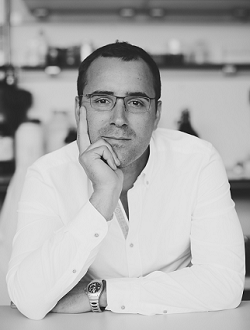 |
Gonçalo Bernardes is a Professor of Chemical Biology at the Department of Chemistry, University of Cambridge, UK and Fellow of Trinity Hall College, Cambridge, UK.
After completing his D.Phil. in 2008 at the University of Oxford, U.K., he undertook postdoctoral work at the Max-Planck Institute of Colloids and Interfaces, Germany, and the ETH Zürich, Switzerland, and worked as a Group Leader at Alfama Lda in Portugal. He started his independent research career in 2013 at the University of Cambridge as a Royal Society University Research Fellow. In 2018 he was appointed University Lecturer (Tenured), and he has been promoted to Reader (Associate Professor) in 2019 and to Full Professor in 2022.
|
The Award consists of a diploma, € 7.500 and an invitation to present a lecture at the EFMC International Symposium in Chemical Biology.
The 2023 Award will be presented at the EFMC-ISCB 2023, which will be held in Basel, Switzerland on November 16-18, 2023.
2023 EFMC PRIZES ANNOUNCED
The EFMC is happy to announce the names of the 2023 "EFMC Prize for a Young Medicinal Chemist or Chemical Biologist in Industry" and the "EFMC Prize for a Young Medicinal Chemist or Chemical Biologis in Academia".
- 2023 EFMC Prize for Young Medicinal Chemist or Chemical Biologist in Academia
The selection committee designated Dr Georg Winter (Research Center for Molecular Medicine of the Austrian Academy of Sciences, Austria) as the winner of the 2023 EFMC Prize for a Young Medicinal Chemist or Chemical Biologist in Academia.
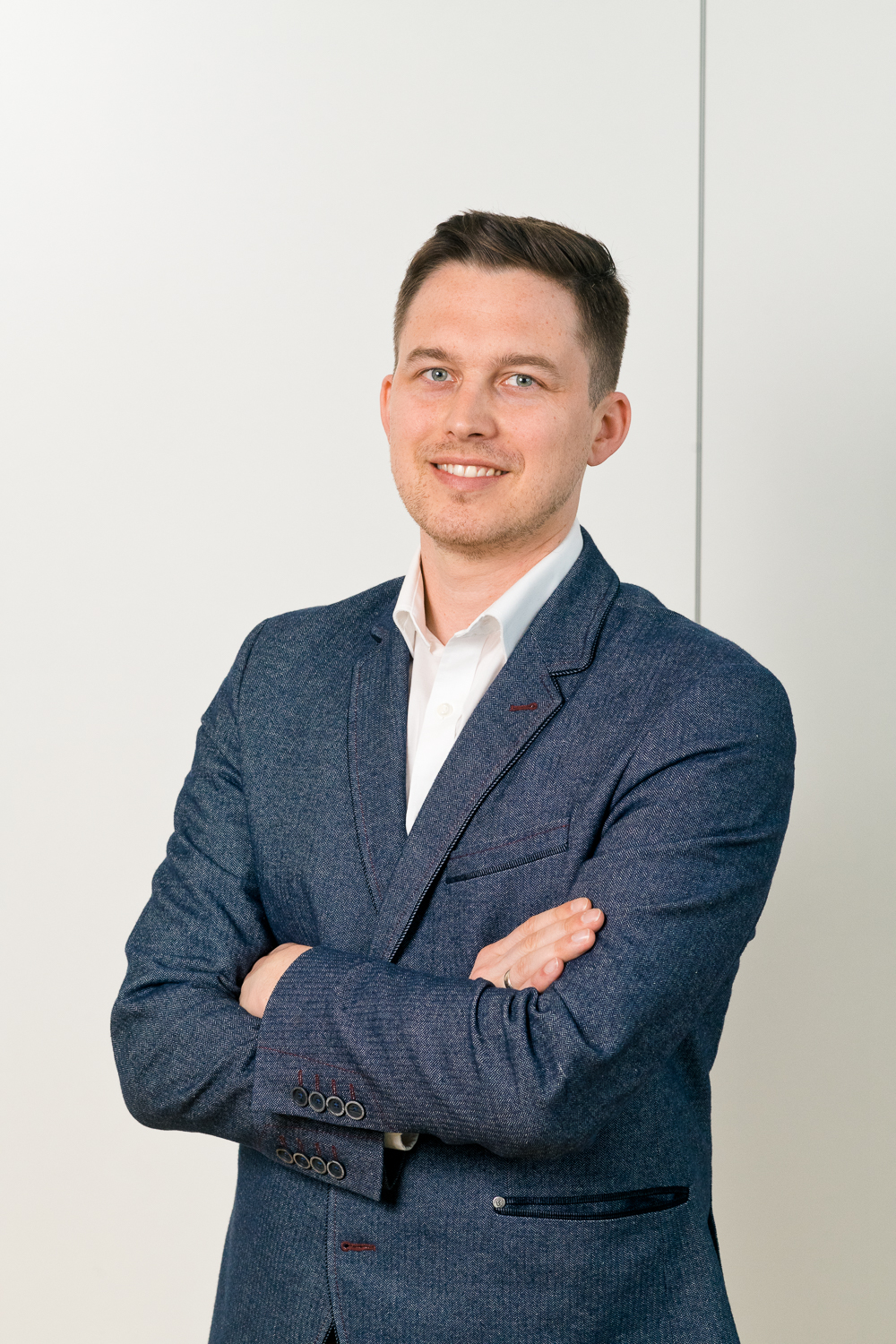 |
Georg Winter is a CeMM Principal Investigator who specializes in chemical biology and cancer research. His lab's focus is on developing pharmacologic strategies to understand and disrupt aberrant transcriptional circuits in cancer using high-throughput and unbiased technologies. Georg has authored more than 40 manuscripts and received multiple awards for his contributions to the field of targeted protein degradation. His group is currently exploring the concept of proximity-inducing small molecules to rewire cellular circuits. |
Dr Marco Di Antonio (Imperial College London, United Kingdom) and Dr Valle Palomo (IMDEA Nanociencia, Spain) have been recognised as the most meritorious runners-up.
- 2023 EFMC Prize for Young Medicinal Chemist or Chemical Biologist in Industry
The selection committee designated Dr Teresa De Haro Garcia (UCB, Belgium) as the winner of the 2023 EFMC Prize for a Young Medicinal Chemist or Chemical Biologist in Industry.
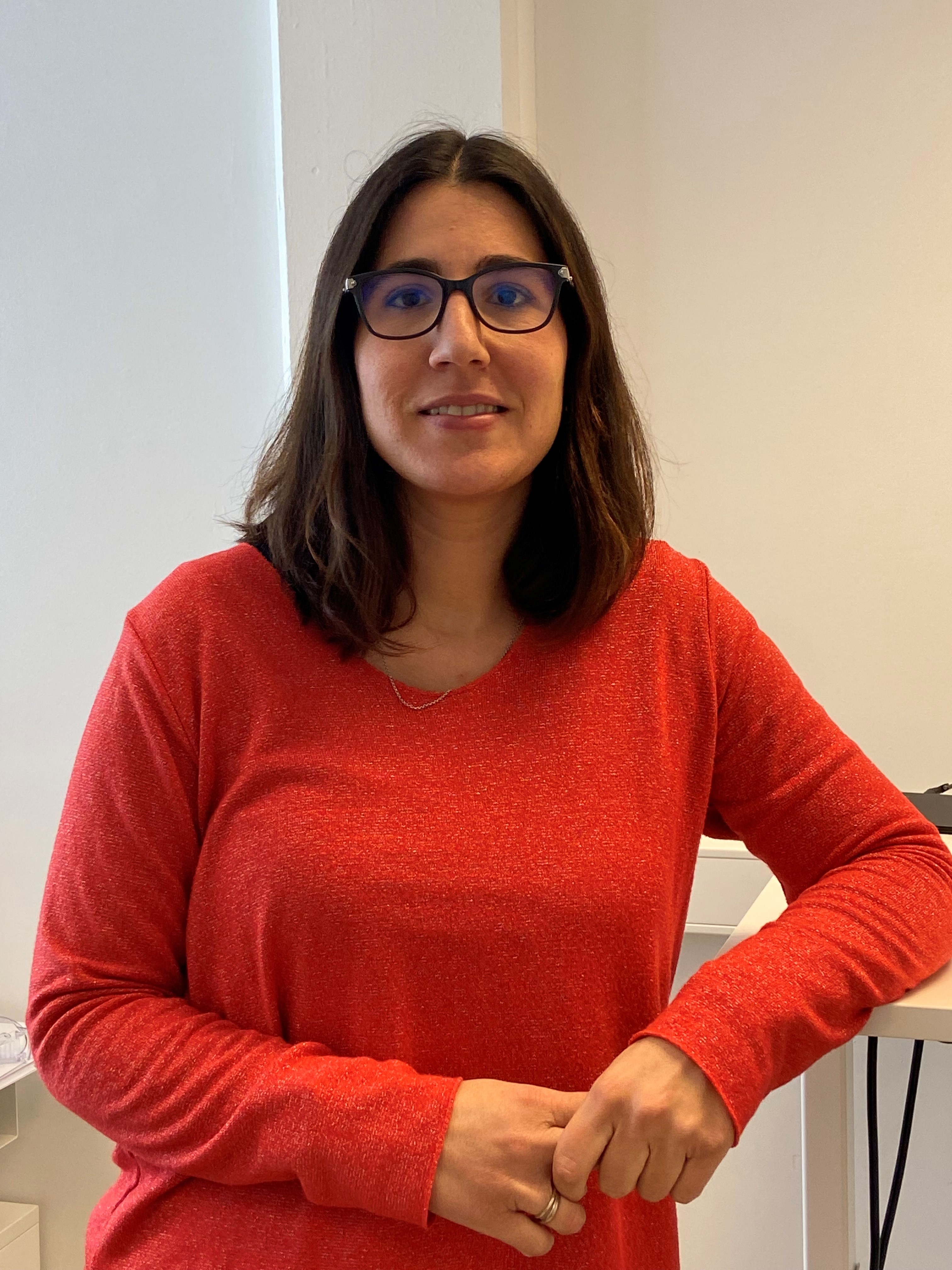 |
Teresa de Haro obtained her master’s degree in Chemistry at the Autónoma University in 2007. In 2012 she received her PhD from the University of Zurich with Prof. Cristina Nevado thereafter joining the group of Prof. Alois Fürstner at the Max-Planck-Institut für Kohlenforschung (Germany) as a post-doctoral associate. In 2013 she moved to UK to work at Eli Lilly (Windlesham) before joining UCB Slough in 2014. Since 2018, Teresa works as principal scientist at UCB Braine (Belgium). |
Dr Jean Baptise Langlois (Novartis, Switzerland) and Dr Afjal Miah (GlaxoSmithKline, United Kingdom) have been recognised as the most meritorious runners-up.
The two prizes are given annually and consist of a diploma, € 1.000 and an invitation for a short presentation at an EFMC symposium. For the 2023 edition, the prize-winners are invited to give an oral communications at the IX EFMC International Symposium on Advances in Synthetic and Medicinal Chemistry (EFMC-ASMC 2023), scheduled to take place in Zagreb, Croatia on September 3-7, 2023.
More information about EFMC Prizes.
2023 EFMC-YSN PhD PRIZE AWARDED
For the fourth edition of the prize, the selection committee designated Zuzanna Kozicka (Friedrich Miescher Institute for Biomedical Research (University of Basel), Switzerland) as the winner of the 2023 EFMC-YSN PhD Prize.
Margarida Espadinha (University of Antwerp, Belgium) has been recognised as the most meritorious runner-up.
The prize will consist of a diploma, 500€ and an invitation to deliver an oral communication at the EFMC Young Medicinal Chemists' Symposium (EFMC-YMCS). The 2023 winner will also receive a free registration and a 500€ travel grant to attend both the IX EFMC International Symposium on Advances in Synthetic and Medicinal Chemistry (EFMC-ASMC 2023) and the 10th EFMC Young Medicinal Chemists' Symposium (EFMC-YMCS 2023) which will take place in Zagreb, Croatia on September 3-7 & September 7-8, 2023. LITERATURE SPOTLIGHT
The “literature spotlight” section of the newsletter will bring you a summary of recently published research in a concise and accessible way. Multiple thematics from different journals will be highlighted thanks to the valuable contribution of members of the EFMC working groups.
This latest contribution will focus on the recently published article “Synthesis and Structural Characterization of Macrocyclic Plasmin Inhibitors.”
The trypsin-like serine protease plasmin is a pivotal enzyme of fibrinolysis and degrades fibrin clots into soluble fragments. In physiological conditions, the fibrinolysis and the blood coagulation cascade ensure a normal blood flow in the circulation and prevent thrombosis or bleeding. In hyperfibrinolytic situations, enhanced plasmin activities can cause bleeding disorders. In addition, in low- and middle-income countries, postpartum hemorrhage is still the major cause of maternal mortality. Therefore, plasmin inhibitors could be exploited to reduce such bleeding complications.
Wiedemeyer et al. presented two series of macrocyclic plasmin inhibitors bearing a C-terminal benzylamine group. The introduction of a N-terminal phenylsulfonyl group led to analogues with sub-nanomolar inhibition constants. The first X-ray crystallographic structures of these macrocyclic inhibitors in complex with a Ser195Ala microplasmin mutant were disclosed and supported the Structure-Activity Relationships explanations. The most interesting molecules showed a good potency and excellent selectivity as plasmin inhibitors, as well as a robust antifibrinolytic activity in plasma. Compared to a reference compound, the novel inhibitors showed a more pronounced antifibrinolytic activity. Further investigations and in vivo studies will allow efficacies and half-lives of these inhibitors in disease models to be assessed.
Wiedemeyer SJA, Wu G, Pham TLP, Lang-Henkel H, Perez Urzua B, Whisstock JC, Law RHP, Steinmetzer T. Synthesis and Structural Characterization of Macrocyclic Plasmin Inhibitors.
ChemMedChem. 2023, 18 (6), e202200632. doi: 10.1002/cmdc.202200632. 15th EFMC-YSN MEDCHEMBIOONLINE | NEW TECHNOLOGIES IN DRUG DISCOVERY
During the 15th edition, you will get the chance to hear Phil Baran talking about Accelerating Medicinal Chemistry with Electricity, exchange with experts on New Technologies in Drug Discovery, and get at crash course on How to Fund your Research!
The event will take place on May 25 between 16:30 and 18:30 CEST. Have a look at the programme:
- Keynote Lecture: "Accelerating Medicinal Chemistry with Electricity"
- Prof. Phil Baran (The Scripps Research Institute, United States)
- "E-lluminating” the Renaissance of Organic Synthesis
- Dr Charles Jiao (IKA, Germany)
- Soft-skill Training | How to Fund Your Research: MSCA Postdoc Fellowships, ERC Starting Grants & Testimonials
- Mrs Paz Yanez-Murillo (University of Antwerp, Belgium)
- Dr Greta Klejborowska (University of Antwerp, Belgium)
- Round Table Discussion: "New Technologies in Medicinal Chemistry"
- Prof. Phil Baran (The Scripps Research Institute, United States)
- Dr Charles Jiao (IKA, Germany)
- Dr Kevin Lam (University of Greenwich, United Kingdom)
- Prof. Lucia Tamborini (University of Milan, Italy)
- Panelist to be announced
The event is free and open to everyone thanks to the support of IKA.
More info and registration on www.medchembio.online.
EFMC PHOTO CONTEST 2023 – ILLUMINATING REALITY
For our 2023 Photo Competition, we invite researchers around the globe to submit pictures showing how their work contributes to “illuminating reality”.
Do you feel up to the challenge!?
The contest is open to scientists from any level and affiliation. The submitted pictures will be judged by a first round of online voting and the 20 best shots will be showcased at the EFMC-ASMC 2023 for attendees to vote live!
Submit your best picture and win up to €50! Two runners-up will also be acknowledged and receive 25€ each.
Closing date: July 10, 2023
Enter the competition!
GET TO KNOW MARTA FRIGOLE VIVAS (DEWPOINT THERAPEUTICS, GERMANY)
In this edition, our MedChemBioConversations is with Dr Marta Frigole Vivas from Dewpoints Therapeutics, Germany.
Get to know her better by reading the interview below:
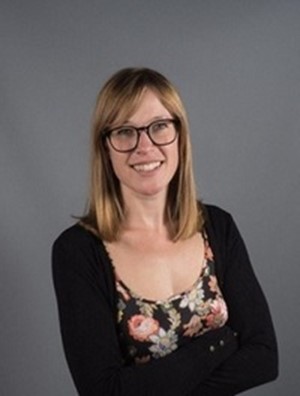
How did you get interested in Medicinal Chemistry?
It was during my bachelors. I remember perfectly the first time I saw a compound co-crystallized with its protein target and how well it was fitting. In that moment, I became fascinated by the fact that we can design and synthesize molecules that perfectly fit into a protein pocket and exert a biological effect.
Where and when did you obtain your PhD diploma?
I obtained my PhD from the University of Barcelona / IRB Barcelona in 2020. After my PhD, I shifted to industry right away.
After my bachelor, I became interested in finding new methodologies to target intrinsically disordered proteins (IDPs). IDPs are a class of proteins that do not have a stable tertiary structure, therefore are not amenable to structure-based drug discovery methods. Because of that, these targets have been historically considered to be “undruggable” even if they represent 30-50% of our proteome and are drivers of many diseases. During my PhD, I designed and synthesized small molecules to modulate the function of the intrinsically disordered region of androgen receptor to treat advanced prostate cancer. Tuning the propensity of the IDP to form biomolecular condensates emerged as a promising strategy.
Where are you currently working and what is your current position?
I am currently a senior scientist at Dewpoint Therapeutics, a biotechnology company advancing the knowledge on biomolecular condensates to identify new targets and mechanisms of action across multiple biological pathways to develop new therapies.
I am interested in the intersection between biology and chemistry, deciphering new mechanisms of action to tackle diseases without a current cure and/or treatment.
How would you explain what your research area is to non-scientists?
The cell is like a factory, where everything needs to work in a regulated manner to deliver a product. However, the cell factory is very crowded and at first glance it seems not very well organized as there are only a few walls and people, departments and machines all share one same open space. So, how can the cell be so efficient in delivering the right products? In 2009, the lab of Anthony Hyman (co-founder of Dewpoint Therapeutics) discovered that cells concentrate activities without the need of building walls by creating a wall-free but separate environment, which we call biomolecular condensates.
Biomolecular condensates bring all the molecules that are needed to perform an activity together in time and space. For example, a biomolecular condensate for packaging can be created on demand, but only when a product is ready to be packaged. At this moment, all the people, machines, and materials would be brought together, and the product would be put into boxes. Once the job is finished, it would disassemble.
Later, in 2015, the Hyman lab also discovered that aberrant condensates are hallmarks of diseases with unmet medical needs. His lab focused on neurodegenerative diseases. Subsequently, the lab of Rick Young (also a co-founder of Dewpoint Therapeutics) showed similar results in cancer. I am now studying aberrant condensates in disease to discover new therapies.
What do you like best about your work?
I love the interdisciplinary nature of drug discovery and the constant learning that goes with it. Moreover, drug discovery is a team sport and I enjoy leading and being part of an international multicultural team.
What kind of skills does your work require?
For the technical side of the job, I would say good hypothesis testing, strong data analysis, no fear to innovate and constantly learning. For the people side of the work, excellent communication, pro-activity/leadership and humbleness.
What do you consider your greatest achievement in your scientific career?
To know that the work I do will hopefully deliver novel drugs into the market and help patients.
Which of your papers are you most proud of and why?
The work that I am most proud of is not part of a paper but a patent. I believe basic research is a must, but I thrive when we can translate our laboratory findings into treatments.
What are the features of a successful PhD student or postdoc?
Resilience and curiosity. I would like to emphasize that a successful PhD or postdoc is not measured by the impact of the papers (at least in industry) but the hard and soft skills one acquires during their PhD.
What advice would you give to someone who wants to know more about your field?
Reach out to anyone who can tell you more about it! I am personally always happy to discuss science and career development - and I am sure that everyone else is, too! So don’t be shy!
What would you like to ask from other medicinal chemists?
I imagine a world in which everyone is given the right opportunities because of their capabilities and not based on their gender or background. Unfortunately, there is still a lot of work left to do to achieve (gender) equality in science and we can only achieve it if we all work together.
What is the most embarrassing thing you have done in the lab while doing experiments?
The most embarrassing experience was one day during my first summer internship in which, after the lab, I took the subway home and no-one wanted to sit next to me, although the subway was very crowded. Once home, I realised that I was smelling very bad, like rotten fish, as I had been working with large amounts of an amine all day.
What are your recommendations for a book, podcast, website, blog, YouTube channel or film?
Which field of medicinal chemistry do you consider the most promising for the future?
The whole pharma world is now investing heavily in RNA therapeutics. Given the large interest in this field, I expect it to yield positive outcomes in the near future.
What would you expect to be the next major breakthrough in medicinal chemistry?
I might be biased since I work on the field of biomolecular condensates, but I would say the modulation of biomolecular condensates with small molecules to address current unmet needs. CALL FOR VOLUNTEERS: JOIN THE EFMC-YSN COMMUNICATION TEAM!
Are you a social media lover with a passion for science? Do you want to make connections and find new opportunities in medicinal chemistry and chemical biology? The EFMC Young Scientists Network (YSN) is currently looking for contributors!
The EFMC Young Scientists Network (YSN) is seeking volunteers to help us create engaging and informative content that will captivate and inspire others. As a volunteer, you will contribute to communicate on our activities such as networking, training, support to young scientists, events, and meetings.
If you have experience with writing on Wikipedia, we would also love to hear from you! Our network is looking for skilled writers who can help us create and update articles related to the EFMC and correlated fields.
So why wait? Join EFMC-YSN today and start building a strong network that will help you thrive in your early career. Contact us at ysn@efmc.info to learn more about volunteering with EFMC-YSN.
#MEDCHEMCASES - SEMINAR BY THE DIVISION OF MEDICINAL CHEMISTRY OF THE GERMAN CHEMICAL SOCIETY (GDCH)
The MedChem Division of the German Chemical Society (GDCh) would like to invite you to the next #MedChemCASES online seminar which will be held on May 16 by Prof. Oliver Hantschel.
The topic of the webinar will be “Targeting Oncogenes with Allosteric Inhibitors and Engineered Monobody Proteins”
Over the past two decades, more than 70 ATP-competitive kinase inhibitors were approved for the treatment of patients with haematological and solid tumors. Despite this remarkable progress, the development of drug resistance severely blunted initial clinical responses. An alternative strategy is the identification and targeting of allosteric sites that are critical for oncogenicity. This could decrease drug resistance, as the allosteric site could be targeted alternatingly or simultaneously. The BCR-ABL fusion tyrosine kinase is the driving mutation of chronic myelogenous leukemia (CML) and some acute lymphoblastic leukemias. Our detailed studies of the structure and regulation of BCR-ABL have led to the identification of the allosteric myristoyl binding pocket that is critical for BCR-ABL-dependent oncogenic transformation. I will present how based on these insights, small-molecule myristoyl pocket inhibitors were developed, of which asciminib was recently approved for the treatment of CML patients.
In the second part of my presentation, I will present how monobodies can be used to target protein-protein interactions of key oncogenes. Monobodies are synthetic in vitro-evolved binders built on the fibronectin type III (FN3) domain. They are only ~10kDa in size, lack cysteine residues and can bind their target proteins with low nanomolar affinity. We extensively use monobodies to target key nodes of oncogenic signaling networks: These include BCR-ABL, the oncogenic SHP2 and SHP1 tyrosine phosphatase, the SH2 domains of Src family kinases, the transcription factors STAT3 and STAT5 and the E3 ubiquitin ligase c-Cbl. I will focus on our efforts in converting monobodies from potent pre-clinical target validation tools to next-generation protein-based therapeutics by developing approaches to deliver monobody proteins to cells and to engineer mirror-image D-monobodies.
Register for free here.
#GDCh (MedChem Division), #NextGenMedChem.
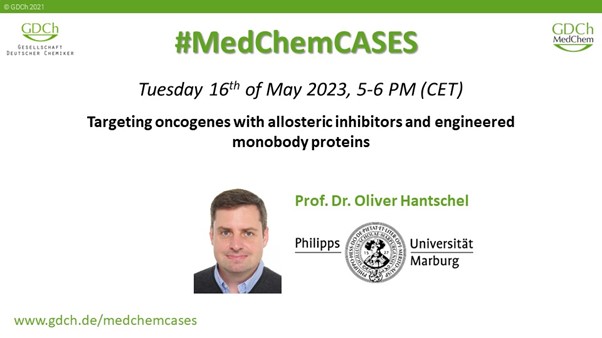
NEWS FROM THE FRENCH SOCIÉTÉ DE CHIMIE THÉRAPEUTIQUE (SCT)
The French Société de Chimie Thérapeutique is inviting you to join their annual meeting: 57th International Conference on Medicinal Chemistry (RICT 2023), scheduled on July 5-7, 2023 in Lille, France.
The congress, sponsored by the EFMC, will be devoted to “Drug Discovery and Selection” and will include 11 thematic sessions, 26 invited lecturers, 2 awards lectures, a poster session, and a commercial exhibition.
Early-bird registration deadline, and deadline for poster submission is May 11!
More information on www.rict2023.org.

NEWS FROM THE BIOLOGICAL AND MEDICINAL CHEMISTRY SECTOR (BMCS) OF THE ROYAL SOCIETY OF CHEMISTRY (RSC)
The BMCS is pleased to open nomination calls for the Capps Green Zomaya Memorial Awards 2024 and the BMCS Hall of Fame and Medal 2023, as well as some upcoming events.
- 10th SCI/RSC Kinase Symposium on Inhibitor Design
- 3rd Synthesis in Drug Discovery and Development
- 3rd RSC Anglo-Nordic Medicinal Chemistry Symposium
Capps Green Zomaya Memorial Award 2024
The Biological and Medicinal Chemistry Sector of the Royal Society of Chemistry is pleased to invite nominations for the eleventh Capps Green Zomaya Memorial Award in medicinal or computational chemistry. The Award will be given to the individual judged to have made an important contribution to the discovery or development of new medicines. Nominations are invited for candidates, up to the age of 40, working in UK or international laboratories (candidates over the age of 40, who have taken career breaks, will be considered). A Royal Society of Chemistry commemorative medal and certificate will be awarded to accompany the prize of £2,000
Nominations should be submitted no later than 31 October 2023 to: RSC-BMCS Secretariat, Hg3 Conferences Ltd, email: events@hg3.co.uk
For further details, please access the activities link on www.rsc.org/bmcs
BMCS Hall of Fame and Medal 2023 – Call for nominations.
The BMCS is pleased to announce the 2023 call for nominations for its Hall of Fame and associated medal which recognises chemists for outstanding, sustained, significant contributions to any area of interest to the BMCS, including medicinal chemistry, agriscience, bio-organic chemistry, and chemical biology. Independent nominations may be submitted by e-mail outlining the justification and including the nominee’s CV and publication list. Additional independent letters of support to reinforce the nomination are strongly encouraged. Nominees should be resident in the UK or continental Europe, or have spent a considerable proportion of their career there. There is no requirement to be an RSC or BMCS member. There are no age restrictions, and nominees may have an academic or industrial background. Nominations should be submitted by the end of September 2023 and the outcome will be communicated to nominators and nominees by mid-December 2023. Inductees will receive a medal and certificate, and will be invited to give a plenary lecture at an appropriate BMCS organized conference.
Independent nominations should be sent to the RSC-BMCS Secretariat, Hg3 Conferences Ltd, email: events@hg3.co.uk from 1 March to 30 September 2023.
For the full list of requirements and terms and conditions, please see the guidance notes above
10th SCI/RSC Kinase Symposium on Inhibitor Design
9thand 10th May 2023, SCI, London, UK
Website: https://www.rscbmcs.org/events/kinase/
Synopsis: With more than 70 FDA-approved small molecules, the field of kinase inhibition continues to attract significant investment from the drug discovery and development community. The 10th SCI/RSC symposium on kinases will encompass plenary lectures on emergent topics and case studies of ongoing programmes as well as successful past programmes. A range of topics including new screening approaches, brain penetrant kinase inhibitors, induced protein degradation, allosteric inhibitors and kinase inhibition for immuno-oncology will be covered, along with views and perspectives on the future of kinase inhibitor research
3rd Synthesis in Drug Discovery and Development
23rd – 24th May 2023, Virtual
Website: https://www.rscbmcs.org/events/sddd23/
Synopsis: Synthesis is at the heart of drug discovery and development. The industry has increasingly demanded higher quality clinical candidates and has sought to exploit less druggable biological targets. Densely functionalised small molecules with a high degree of synthetic complexity are often the result of these demands. Successful programmes therefore require the application of innovative synthesis in all stages of discovery and development. The medicinal chemist’s toolbox is also enhanced by the introduction of novel bioisosteres, often made available only through the application of new synthetic methods. This symposium aimed to celebrate the crucial role of synthesis in the success of drug discovery and development
3rd RSC Anglo-Nordic Medicinal Chemistry Symposium
13th-16th June 2023, Hotel Comwell Borupgaard, Snekkersten, Denmark
Deadline for poster abstracts is 4th May 2023
Website: https://www.rscbmcs.org/events/anmc/
Synopsis: Organised with Nordic affiliations, the scientific programme will feature themed lectures, focusing on medicinal chemistry and related technologies and disciplines across a range of drug targets and modalities. A distinguishing feature of this symposium is the collegiate style which encourages an atmosphere of information sharing and learning. THIS NEWSLETTER IS KINDLY SPONSORED BY WuXi AppTec
|
|
|
|
|
|
ISSUE SPONSORED BY

As a global company with operations across Asia, Europe, and North America, WuXi AppTec provides a broad portfolio of R&D and manufacturing services that enable the pharmaceutical and healthcare industry around the world to advance discoveries and deliver groundbreaking treatments to patients.
Read more
EFMC ORGANISED EVENTS
May 25, 2023
Virtual Event
15th MedChemBioOnline
June 10-13, 2023
Boston, United States
ACSMEDI-EFMC Medicinal Chemistry Frontiers
September 3-7, 2023
Zagreb, Croatia
IX International Symposium on Advances in Synthetic and Medicinal Chemistry (EFMC-ASMC)
September 7-8, 2023
Zagreb, Croatia
10th EFMC Young Medicinal Chemists' Symposium (EFMC-YMCS)
November 16-18, 2023
Basel, Switzerland
EFMC International Symposium on Chemical Biology (EFMC-ISCB)
EFMC SPONSORED EVENTS
May 21-24, 2023
Siena, Italy
IX European Workshop in Drug Synthesis (EWDSy)
May 23-24, 2023
Virtual Event
3rd Synthesis in Drug Discovery and Development
June 13-16, 2023
Snekkersten, Denmark
3rd RSC BMCS Anglo-Nordic MedChem
June 22, 2023
Santiago de Compostela, Spain
IX Symposium of Medicinal Chemistry Young Researchers
July 5-7, 2023
Lille, France
RICT 2023
September 17-20, 2023
Chieti, Italy
National Meeting on Medicinal Chemistry (NMMC28)
September 20-22, 2023
Vila Real, Portugal
I International Meeting Molecules4Life
December 7, 2023
Oxford, United Kingdom
RSC-BMCS Postgraduate Symposium XVII
CERTIFIED SCHOOLS
June 19-21, 2023
Santiago de Compostela, Spain
VIII SEQT Summer School
July 2-6, 2023
Urbino, Italy
European School of Medicinal Chemistry (ESMEC)
September 10-15, 2023
Vienna, Austria
Vienna Summer School Drug Design
JOB PORTAL
PhD position in medicinal chemistry: Inhibition of the drug efflux activity of Ptch1 to overcome chemotherapy resistance, Université Côte d'Azur, FRANCE
Read more
PI, Pompeu Fabra University, SPAIN
Read more
Applications Scientist, Schrödinger, FRANCE
Read more
|
|
